
Nationwide, the median annual household income is $57,652. It varies widely by state, from $42,000 in Mississippi to nearly $79,000 in Maryland. Despite these differences, each U.S. state — even the poorest — is home to at least one county in which the median annual household income exceeds the national median. In some states, the wealthiest county’s median income is more than double the nation’s median.
Many of the wealthiest counties are within commuting distance of major cities. In all but seven states, the wealthiest county is located in a major metropolitan area. These major population centers are home to a greater concentration of high-paying jobs, which can help keep unemployment low and incomes high.
24/7 Wall St. reviewed the median household income in all U.S. counties and county equivalents to identify the wealthiest county in each state.
Nearly every state’s wealthiest county has a relatively well-educated population. In 46 states, the bachelor’s degree attainment rate in the wealthiest county is higher than the statewide rate.
The four exceptions — counties in North Dakota, Wyoming, Nevada, and Montana — are located in resource-rich areas. In these states, the richest county’s economy is dependent on oil or mineral extraction. These industries are often the source of high-paying jobs that do not require a college degree.
To identify the richest county in each state, 24/7 Wall St. reviewed median annual household incomes for each U.S. county using 5-year estimates from the U.S. Census Bureau’s 2017 American Community Survey. We only considered counties with income estimates with a maximum 10% margin of error. We also reviewed in each county the percentage of adults who have earned a bachelor’s degree or higher, poverty rates, and median home values from the ACS. The major metro area noted is the metropolitan statistical area the county lies within. Unemployment rates from the Bureau of Labor Statistics are not seasonally adjusted and are for October 2018.
Click here to see the richest county in every state.
Click here to see the poorest county in every state.

1. Alabama: Shelby County
> County median household income: $74,063
> State median household income: $46,472
> Poverty rate: 8.3%
> Oct. unemployment: 2.8%
> Major metro area: Birmingham-Hoover, AL
Alabama is one of the poorest states in the country. The state’s median annual household income of $46,472 is more than $11,000 below the U.S. median. Alabama also has one of the highest poverty rates of all states at 18%. The residents of Shelby County, which is located just south of Birmingham, tend to be much more affluent. Most households earn more than $74,000 a year, and just 8.3% of residents live in poverty. The county’s higher incomes are likely bolstered by a strong job market. The county’s unemployment rate of 2.8% is well below the state’s 4.1% unemployment rate.
Likely because of its relatively prosperity and strong job market, Shelby County’s population is growing at a faster pace than the state’s population growth rate.. In the past five years, the county’s population grew by 6.9%, more than four times the rate of Alabama’s population growth as a whole.
See all stories featuring: Alabama
[in-text-ad]

2. Alaska: Juneau City and Borough
> County median household income: $90,749
> State median household income: $76,114
> Poverty rate: 7.4%
> Oct. unemployment: 4.3%
> Major metro area: N/A
Alaska, along with Louisiana, is one of two states that does not designate geographic areas as counties, instead defining larger geographic areas as boroughs. Juneau, the state capital, comprises the entirety of one such borough.
As the state capital, many Juneau residents work in government, a sector that often offers its employees high salaries. Of Juneau workers, 22.2% are employed in public administration, more than four times the national concentration in the sector. These workers, as well as many others in Juneau, are much more likely to be qualified for skilled professions. Juneau adults have a 40.3% college degree attainment rate, well above Alaska’s 29.0% rate.
See all stories featuring: Alaska

3. Arizona: Maricopa County
> County median household income: $58,580
> State median household income: $53,510
> Poverty rate: 15.7%
> Oct. unemployment: 3.8%
> Major metro area: Phoenix-Mesa-Scottsdale, AZ
Maricopa is the only county in Arizona in which the median household income surpasses the U.S. median of $57,652 a year. While it is the wealthiest in the state, the county’s median of $58,580 is only slightly higher than that of the nation.
With more than 4 million residents, Maricopa is by far the largest county in Arizona and one of the largest in the entire country. It spans 9,223 square miles, covering 27 cities and towns — including Phoenix — as well as tribal land of three different Native American tribes. County residents are more likely to work in high-paying industries like finance or information than those in any other Arizona County.
See all stories featuring: Arizona

4. Arkansas: Benton County
> County median household income: $61,271
> State median household income: $43,813
> Poverty rate: 10.5%
> Oct. unemployment: 2.6%
> Major metro area: Fayetteville-Springdale-Rogers, AR-MO
Residents of Benton County, Arkansas, are much less likely to live in extreme poverty than residents statewide. Just 4.0% of households in the county live on less than $10,000 per year, less than the 8.5% statewide. The county, which borders Missouri and Oklahoma, has a median household income more than $17,000 higher than Arkansas as a whole.
Arkansas has one of the lowest college attainment rates in the country. Just 22% of adults have finished college and obtained at least a bachelor’s degree. Benton County adults are much more likely to have finished college, with a 31.7% attainment rate. As Benton is one of the only places in Arkansas with an educational attainment rate higher than the national rate, county residents tend to be better qualified for higher-paying jobs than residents in other parts of the state.
See all stories featuring: Arkansas
[in-text-ad-2]

5. California: Santa Clara County
> County median household income: $106,761
> State median household income: $67,169
> Poverty rate: 8.6%
> Oct. unemployment: 2.5%
> Major metro area: San Jose-Sunnyvale-Santa Clara, CA
One of the wealthiest counties in the country, Santa Clara County’s median annual household income of $106,761 exceeds the state median by nearly $40,000 and the U.S. median by nearly $50,000. The county is home to San Jose and the surrounding Silicon Valley area, which has provided many of its residents with high-paying tech jobs.
More than one in five Santa Clara County households — 22.4% — earns over $200,000 annually, more than triple the national share. This high level of income allows residents to obtain a better level of health care, as well as make healthier lifestyle and food decision. These options have likely contributed to better overall health among Santa Clara County residents. The average life expectancy in the county of 82.7 years is more than 4 years longer than the national average.
See all stories featuring: California

6. Colorado: Douglas County
> County median household income: $111,154
> State median household income: $65,458
> Poverty rate: 3.6%
> Oct. unemployment: 2.8%
> Major metro area: Denver-Aurora-Lakewood, CO
Like in many of the wealthier areas of the country, Douglas County residents are much more likely to work in certain high-paying professions than those who live in lower-income areas. For instance, 12% of Douglas County’s labor force works in either finance, insurance, or real estate — all of which tend to be better paying than the average job. Nationwide, just 6.6% of workers are employed in these fields.
Though Colorado is one of the wealthier states, Douglas County is doing much better in several key economic measures. The county’s median household income of $111,154 a year is more than $45,000 higher than the state median. And while Colorado’s poverty rate of 11.5% is well below the 14.6% U.S. poverty rate, in Douglas County, the poverty rate is just 3.6%.
See all stories featuring: Colorado
[in-text-ad]
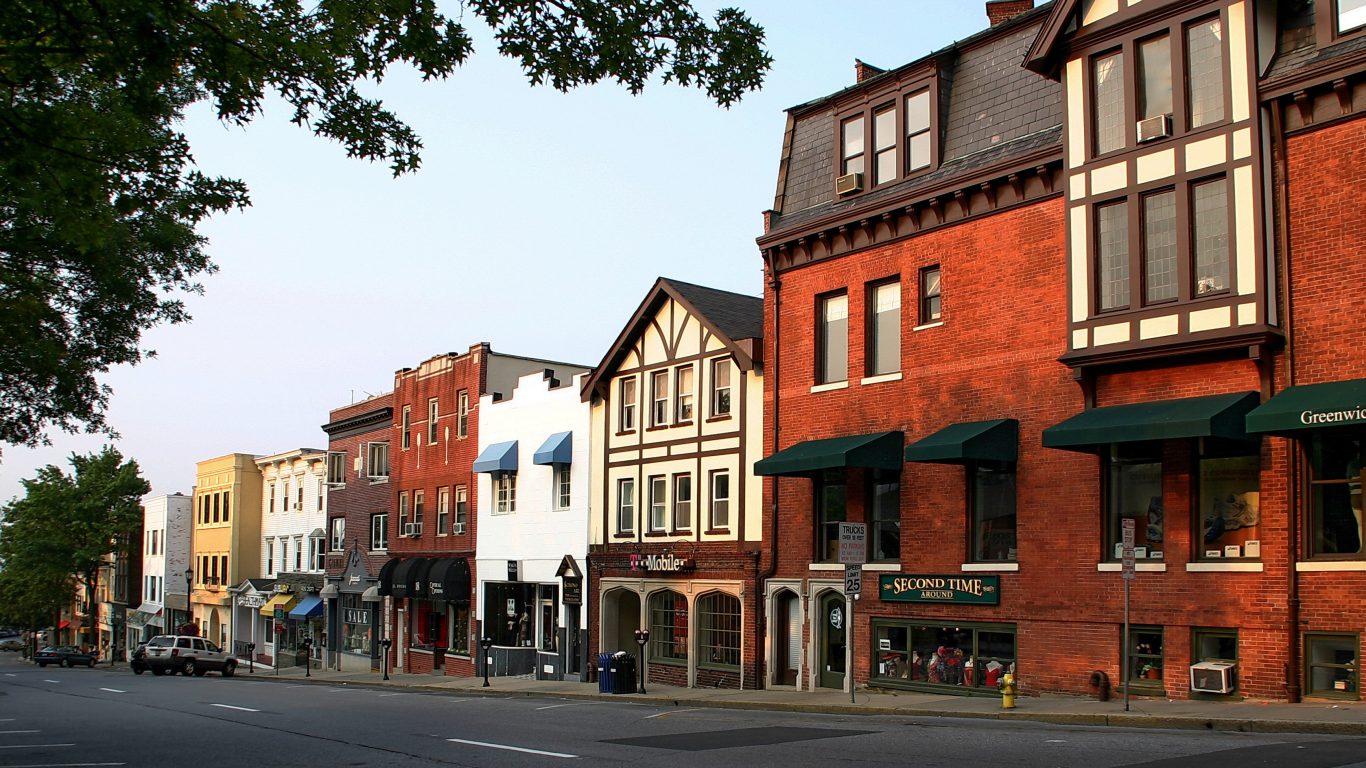
7. Connecticut: Fairfield County
> County median household income: $89,773
> State median household income: $73,781
> Poverty rate: 8.8%
> Oct. unemployment: 3.7%
> Major metro area: Bridgeport-Stamford-Norwalk, CT
Fairfield County sits on Connecticut’s southern border with New York and is within commuting distance from New York City. This helps explains why county workers are nearly twice as likely to work in the relatively high-paying finance and insurance sector as the typical American. Fairfield County households earn more than those in any other part of the state.
As with many of the more prosperous counties, Fairfield County’s population is growing, expanding by 3.1% over the last five years. The county’s population grew by nearly 30,000 people over the past five years, accounting for a 3.1% increase. Overall, Connecticut’s population grew by 0.6%, but without the increases from Fairfield County, its population would have fallen.
See all stories featuring: Connecticut

8. Delaware: New Castle County
> County median household income: $68,336
> State median household income: $63,036
> Poverty rate: 11.9%
> Oct. unemployment: 3.5%
> Major metro area: Philadelphia-Camden-Wilmington, PA-NJ-DE-MD
New Castle County is one of just three in Delaware. It is the only part of the state in which the median household income of $68,336 a year surpasses that of the state, which is $5,300 less. The county is within commuting distance from both Baltimore and Philadelphia, providing its residents easy access to those major cities and all of the high-paying jobs they offer.
Delaware adults have a 31.0% bachelor’s degree attainment rate, in line with the national attainment rate of 30.9%. New Castle County adults are much more likely to have a four-year degree, with a 35.7% degree attainment rate. This higher level of education qualifies many for more lucrative positions.
See all stories featuring: Delaware

9. Florida: St. Johns County
> County median household income: $73,640
> State median household income: $50,883
> Poverty rate: 9.1%
> Oct. unemployment: 2.5%
> Major metro area: Jacksonville, FL
St. Johns County’s poverty rate of just 9.1% is the lowest of Florida’s 59 counties. This is likely, at least in part, due to the area’s relatively low unemployment rate of 2.5%, as compared to Florida’s 3.4% unemployment rate.
Florida has a relatively low bachelor’s degree attainment rate. Just 28.5% of adults hold a four-year degree. Yet St. Johns County 43% of adults hold a college degree, qualifying them for more job opportunities.
See all stories featuring: Florida
[in-text-ad-2]

10. Georgia: Forsyth County
> County median household income: $96,445
> State median household income: $52,977
> Poverty rate: 6.5%
> Oct. unemployment: 3.0%
> Major metro area: Atlanta-Sandy Springs-Roswell, GA
Just a few miles northeast of Atlanta, Forsyth County, Georgia, has a median annual household income of $96,445 — more than $43,000 higher than the median income statewide. More than half of Forsyth County adults hold at least a bachelor’s degree, qualifying them for more high-level, high-paying jobs. Across Georgia, less than 30% of adults graduated from college.
Forsyth County’s population is one of the fastest growing in the country, increasing from 177,103 in 2012 to 211,300 in 2017 — a 19.3% rise. That increase is more than five times the nationwide population growth rate of 3.8%, and nearly four times Georgia’s population rate of 5.0%.
See all stories featuring: Georgia

11. Hawaii: Honolulu County
> County median household income: $80,078
> State median household income: $74,923
> Poverty rate: 9.1%
> Oct. unemployment: 2.3%
> Major metro area: Urban Honolulu, HI
In part because of the high cost of living in a state so far removed from the rest of the country, Hawaii also has a high median household income of $74,923 a year. Honolulu County, which spans the entire island of Oahu, is the only one of Hawaii’s four counties that exceeds the statewide median household income.
Just 9.1% of Honolulu County residents live below the poverty line, more than a full percentage point below the statewide poverty rate. County residents are also less likely to live in extreme poverty. Statewide, 5.5% of households live on less than $10,000 a year. In Honolulu County, 4.8% of households have an income of less than $10,000.
See all stories featuring: Hawaii
[in-text-ad]

12. Idaho: Ada County
> County median household income: $60,151
> State median household income: $50,985
> Poverty rate: 11.8%
> Oct. unemployment: 2.1%
> Major metro area: Boise City, ID
Ada County is one of very few Idaho counties in which the median household income exceeds the national median of $57,652 a year. Ada contains Idaho’s capital and largest city, Boise. This at least partially explains why the county has a higher than typical share of its workforce employed in the public administration sector.
As a state, Idaho has a relatively low unemployment rate at 2.7%. Ada County has an even lower share of its workforce unemployed, at just 2.1%, one of the lower jobless rates nationwide. Over the past five years, the county’s population has climbed much faster than the U.S. as a whole, growing 10.2% as compared to the U.S. growth rate of 3.8%.
See all stories featuring: Idaho

13. Illinois: Kendall County
> County median household income: $89,860
> State median household income: $61,229
> Poverty rate: 5.6%
> Oct. unemployment: 3.6%
> Major metro area: Chicago-Naperville-Elgin, IL-IN-WI
The population of Kendall County, Illinois, is growing at twice the rate of the American population. From 2012 to 2017, the county’s population grew by 7.6%. In the same time frame, the U.S. population grew by 3.8%. Kendall County’s growth is especially notable as the state population hardly grew at all over that time, increasing by just 0.2%.
The county is within the Chicago metro area, offering residents access to jobs in and around the city. The median household income in the county $89,860 a year is more than $28,000 higher than the median in Illinois as a whole. Just 5.6% of county residents live below the poverty rate, while statewide, the poverty rate is more than twice as high at 13.5%.
See all stories featuring: Illinois

14. Indiana: Hamilton County
> County median household income: $90,582
> State median household income: $52,182
> Poverty rate: 5.0%
> Oct. unemployment: 2.9%
> Major metro area: Indianapolis-Carmel-Anderson, IN
Indiana’s poverty rate is in line with the U.S. rate of 14.6%. In Hamilton County, the state’s most affluent county, the poverty rate is roughly a third of that at 5.0%. The low poverty rate is likely bolstered by the county’s relatively low unemployment rate of 2.9%. This level of relative prosperity is likely one of the factors driving the county’s high population growth rate. In the past five years, the county’s population grew by 12.2%, more than six times Indiana’s population growth rate.
Hamilton County’s median household income of more than $90,000 a year is enabling residents to buy much more valuable homes. In Indiana, the typical home is worth just over $130,000. In Hamilton County, the median home is worth $240,000.
See all stories featuring: Indiana
[in-text-ad-2]
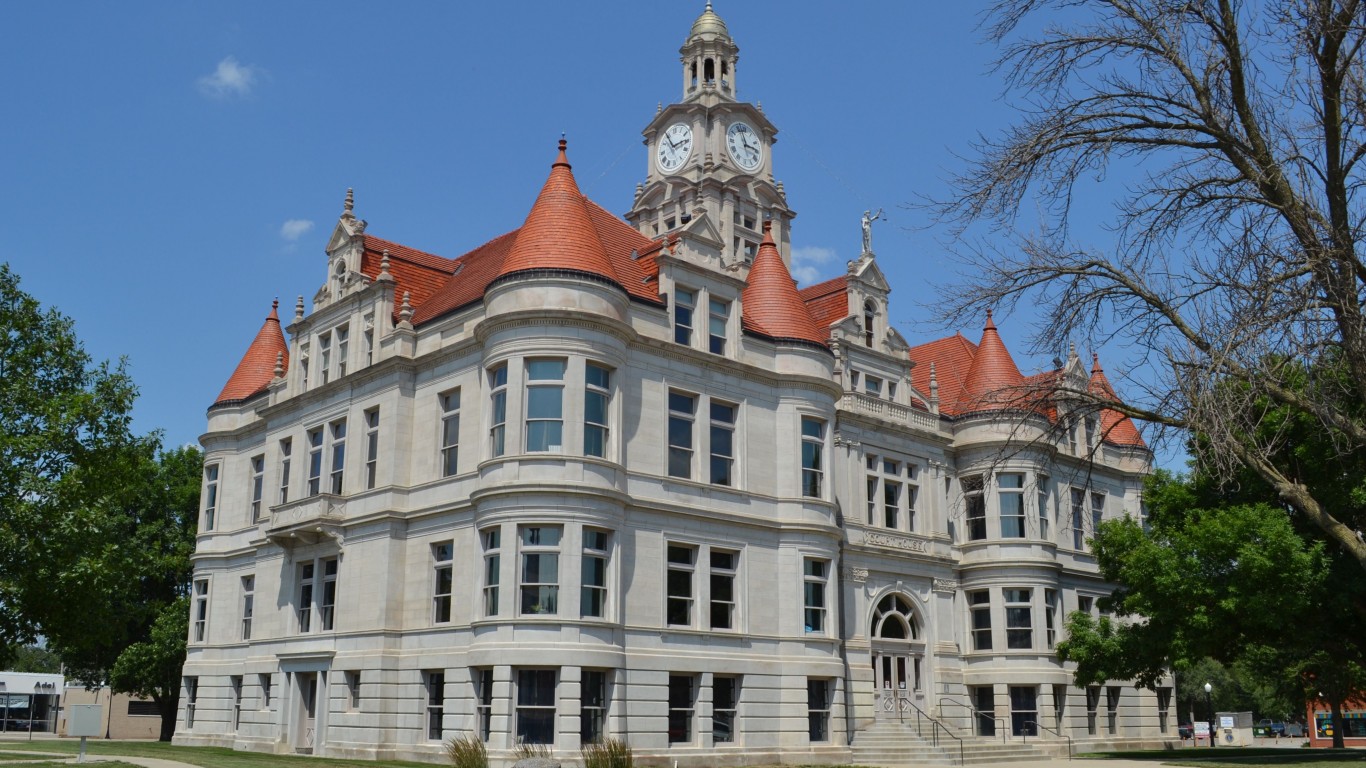
15. Iowa: Dallas County
> County median household income: $82,719
> State median household income: $56,570
> Poverty rate: 5.4%
> Oct. unemployment: 1.3%
> Major metro area: Des Moines-West Des Moines, IA
Just 1.3% of Dallas County’s labor force is looking for work, one of the lowest unemployment rate in Iowa and nationwide. The high level of employment is likely one of the key factors that made Dallas County’s median household income the highest in Iowa. The county’s median household income is $82,719 a year — no other Iowa county comes within $10,000 of that figure.
The low unemployment rate has also likely contributed to Dallas County’s low poverty rate. Just 5.4% of the area’s population is impoverished, less than half of the 12.0% poverty rate across Iowa.
See all stories featuring: Iowa

16. Kansas: Johnson County
> County median household income: $81,121
> State median household income: $55,477
> Poverty rate: 5.6%
> Oct. unemployment: 2.6%
> Major metro area: Kansas City, MO-KS
Johnson County workers tend to be employed in high-paying sectors with more frequency than the workers nationwide. In the county, 9.9% of workers are employed in the generally higher-paying finance, insurance, or real estate sector — compared to the 6.6% share nationwide. County workers are also much more likely to work in professional, scientific, or management services, also high-paying sectors.
Johnson County sits just to the southwest of Kansas City, offering residents the option of going into the city for work. Just 2.6% of Johnson County’s labor force are unemployed as compared to 3.3% of the Kansas labor force.
See all stories featuring: Kansas
[in-text-ad]

17. Kentucky: Oldham County
> County median household income: $92,237
> State median household income: $46,535
> Poverty rate: 5.6%
> Oct. unemployment: 3.3%
> Major metro area: Louisville/Jefferson County, KY-IN
At $92,237 a year, Oldham County’s median household income is nearly double that of the state as a whole. The county’s median household income is nearly $20,000 more than that of the next wealthiest county in the state. The county lies on the Ohio River, just northeast of Louisville, providing its residents access to the numerous jobs available in the city.
Kentucky’s bachelor’s degree attainment rate of 23.2% is one of the lowest among states. In Oldham County, however, 40.4% of adults hold a college degree, the second highest rate in the state. Higher levels of education qualify residents for lucrative careers that many other Kentuckians would not have access to.
See all stories featuring: Kentucky

18. Louisiana: Ascension Parish
> County median household income: $74,748
> State median household income: $46,710
> Poverty rate: 11.7%
> Oct. unemployment: 3.9%
> Major metro area: Baton Rouge, LA
Ascension Parish, Louisiana, is located between Baton Rouge and New Orleans, giving residents access to both the capital city as well as the largest city in the state. This access to two major job market likely helps fight unemployment in the area. At 5.0%, Louisiana has one of the highest unemployment rates of any state. The unemployment rate in Ascension Parish, however, is 3.9%, one of the lowest in the state.
Louisiana’s 19.6% poverty rate is one of the highest in the country. But Ascension Parish residents are less likely to live in poverty, as the county has a 11.7% poverty rate. Not only is that well below the state’s poverty rate, but also it is one of relatively few parishes in the state with a lower poverty rate than the U.S. rate of 14.6%.
See all stories featuring: Louisiana

19. Maine: Cumberland County
> County median household income: $65,702
> State median household income: $53,024
> Poverty rate: 10.7%
> Oct. unemployment: 2.7%
> Major metro area: Portland-South Portland, ME
Over the past five years, the U.S. population grew by 3.8%, yet population growth in Maine was fairly stagnant, yet population growth in Maine was fairly stagnant, increasing by less than 0.1%.Cumberland County’s population growth rate of 2.5% was the highest of any Maine county. This growth may have been bolstered by the area’s relatively strong job market.
Cumberland County has one of the lowest poverty rates in the state, at just 10.7%. Statewide, 12.9% of residents live in poverty. Conversely, Cumberland County has a relatively high share of wealthy residents. Some 6.8% of county households earn at least $200,000 a year, making it the only part of the state with a greater share of wealthy households than the national share of 6.3%.
See all stories featuring: Maine
[in-text-ad-2]

20. Maryland: Howard County
> County median household income: $115,576
> State median household income: $78,916
> Poverty rate: 5.2%
> Oct. unemployment: 3.0%
> Major metro area: Baltimore-Columbia-Towson, MD
Howard County, Maryland, is one of the wealthiest counties nationwide, with the typical household earning more than $115,000 per year. Residents are also among the least likely to face poverty, as just 5.2% live below the poverty line. Nationwide, 14.6% of Americans live in poverty.
The area’s high incomes are partially attributable to high educational attainment. Howard is one of just seven counties nationwide in which at least 60% of adults have a four-year college degree. This means that residents are more likely to be qualified for high-paying careers. The county is within commuting distance of both Washington, D.C. and Baltimore, and most working residents commute to jobs outside of Howard County.
See all stories featuring: Maryland

21. Massachusetts: Norfolk County
> County median household income: $95,668
> State median household income: $74,167
> Poverty rate: 6.5%
> Oct. unemployment: 2.7%
> Major metro area: Boston-Cambridge-Newton, MA-NH
Massachusetts is home to several wealthy counties, but with a $95,668 median annual household income, Norfolk County stands out as the wealthiest. Nationwide, 6.3% of households earn at least $200,000 in a year. In Norfolk County, 16.9% of households earn that much, the highest concentration of any county in the state and one of the highest nationwide.
Massachusetts has the highest college attainment rate in the country, as 42.1% of adult residents have at least a bachelor’s degree. Norfolk County residents are even more likely to have finished college, as 52.5% of adults did.
See all stories featuring: Massachusetts
[in-text-ad]
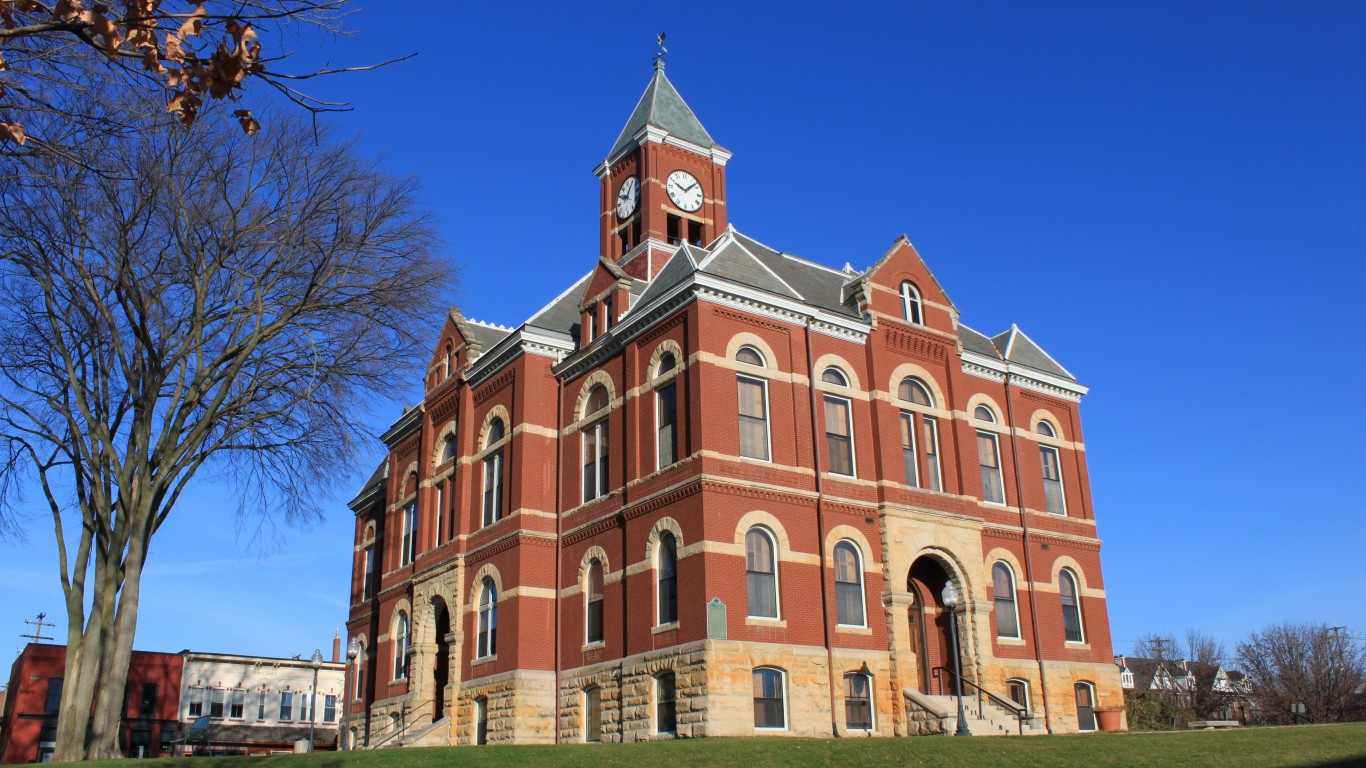
22. Michigan: Livingston County
> County median household income: $78,430
> State median household income: $52,668
> Poverty rate: 5.9%
> Oct. unemployment: 3.3%
> Major metro area: Detroit-Warren-Dearborn, MI
Of Michigan’s 81 counties, 70 have a median household income lower than the U.S. median of $57,652 a year. At $78,430, Livingston County has the highest median annual household income in the state by more than $5,000. The high income is likely bolstered by the high level of education of county residents. In the county, 34.7% of adults have a bachelor’s degree, compared to 28.1% of adults statewide.
Like much of the state, manufacturing is important in Livingston County. The county resides between Detroit and Lansing, two traditional manufacturing hubs, particularly for automobiles. Nationwide, 10.3% of workers are employed in the manufacturing sector. In Livingston County, 18.1% of workers are.
See all stories featuring: Michigan
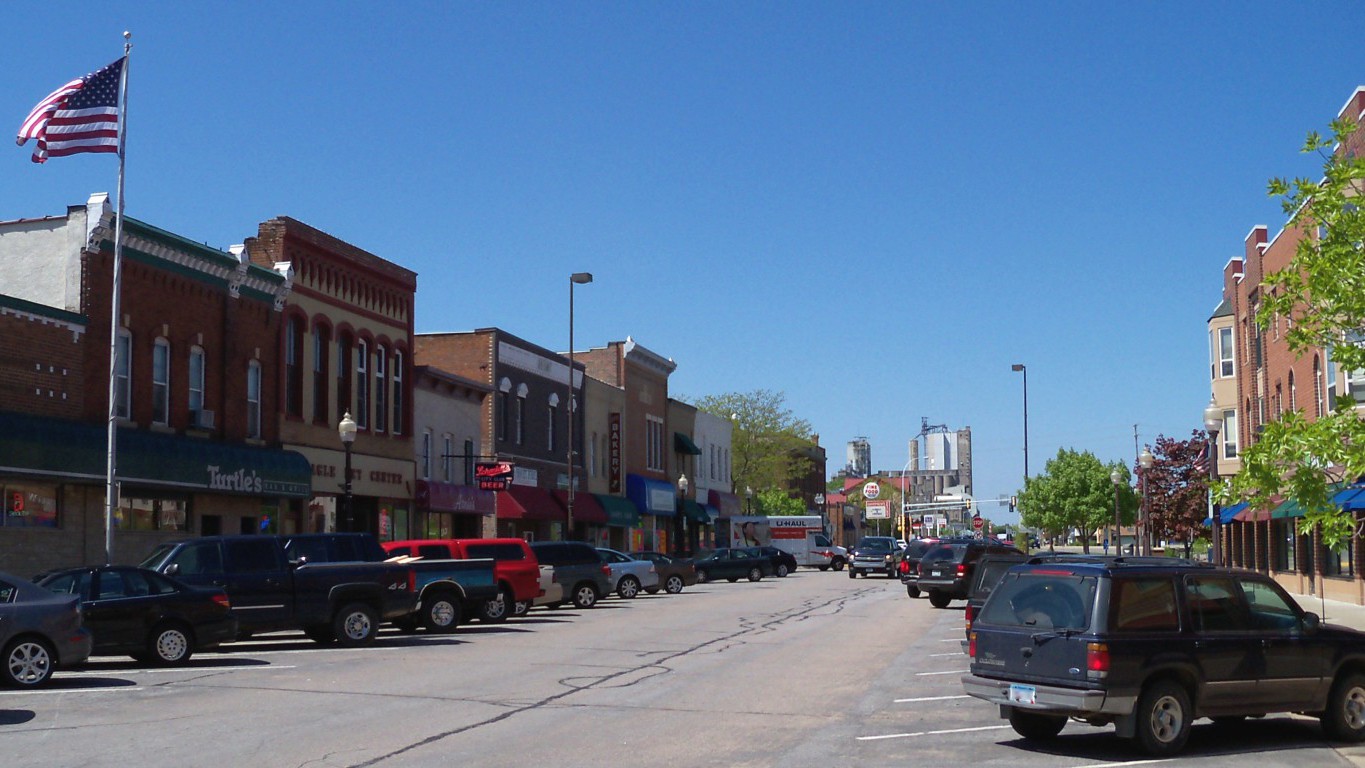
23. Minnesota: Scott County
> County median household income: $93,151
> State median household income: $65,699
> Poverty rate: 5.6%
> Oct. unemployment: 2.0%
> Major metro area: Minneapolis-St. Paul-Bloomington, MN-WI
Just 5.6% of Scott County residents live in poverty, 4.9 percentage points lower than the poverty rate in Minnesota. The low poverty rate is likely partly the result of the county’s 2.0% unemployment rate, one of the lowest in the state.
Scott County sits just 20 miles away from Minneapolis, so residents can commute to the Twin Cities for work. This convenient location may help explain why Scott County’s population is growing so quickly. Over the past five years, the area’s population increased by more than 10,000 people, an 8.2% increase — more than double the population growth rate of the state as a whole.
See all stories featuring: Minnesota

24. Mississippi: Madison County
> County median household income: $68,600
> State median household income: $42,009
> Poverty rate: 12.0%
> Oct. unemployment: 3.2%
> Major metro area: Jackson, MS
Mississippi has the lowest median annual household income of any state, at just over $42,000. The U.S. median is over $15,000 higher. Madison County’s median household income is more than $26,000 higher. Madison has a relatively low poverty rate of 12.0%, especially for Mississippi. Statewide, 21.5% of residents live in poverty, the second highest rate of all states.
Mississippi also has the lowest median home value in the country, at less than $110,000. In Madison County, homes are typically worth over $100,000 more, at $213,400. Higher home values generally reflect better economic conditions and a more desirable place to live.
See all stories featuring: Mississippi
[in-text-ad-2]
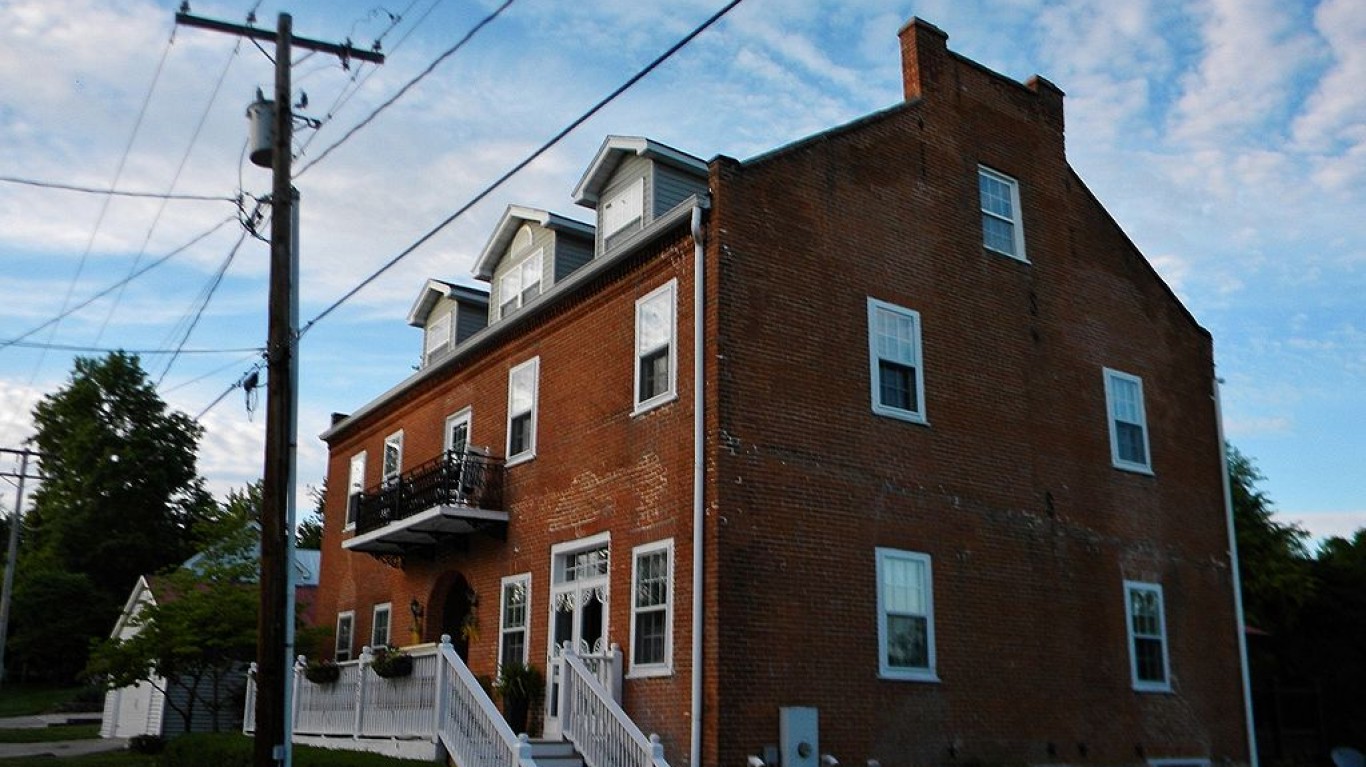
25. Missouri: St. Charles County
> County median household income: $78,380
> State median household income: $51,542
> Poverty rate: 5.7%
> Oct. unemployment: 1.9%
> Major metro area: St. Louis, MO-IL
St. Charles County is a wealthy county just outside of St. Louis. The area’s $78,380 median annual household income is more than 50% higher than Missouri’s median income. Missouri has a an unemployment rate of more than 3%, but St. Charles County’s unemployment rate is much lower, at 1.9%.
Statewide, 28.2% of Missouri adults hold at least a bachelor’s degree. In St. Charles County, 37.1% of adults have at least a four-year degree. This high level of educations allows county residents to qualify for more highly specialized positions.
See all stories featuring: Missouri

26. Montana: Richland County
> County median household income: $66,572
> State median household income: $50,801
> Poverty rate: 5.9%
> Oct. unemployment: 2.9%
> Major metro area: N/A
With just 11,405 residents, Richland County has the smallest population of any county that ranked as the wealthiest in its state. Unlike most of the other wealthiest counties in their state, Richland has a significantly lower college degree attainment rate. Less than 20% of area adults finished college, compared to more than 30% of Montana adults overall.
Typically, places with a better-educated population have higher incomes, as a greater share of the population works in specialized and better-paying jobs. Yet Richland County residents have been able to find good paying jobs in part because of their proximity to North Dakota and jobs in the Bakken Shale during the oil boom there. Some 17.9% of county workers are employed in the agriculture, fishing, hunting or mining sector, more than nine times the national share of workers.
See all stories featuring: Montana
[in-text-ad]
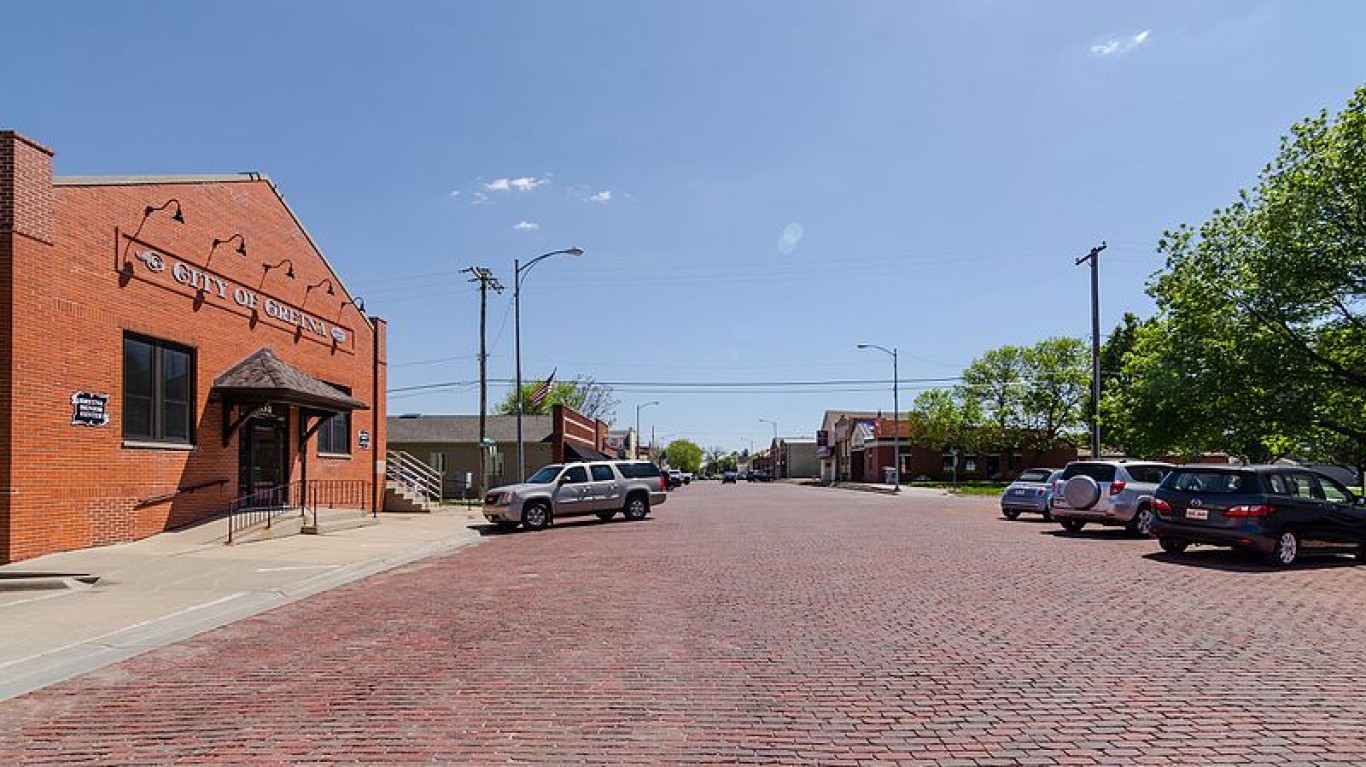
27. Nebraska: Sarpy County
> County median household income: $75,752
> State median household income: $56,675
> Poverty rate: 5.3%
> Oct. unemployment: 2.5%
> Major metro area: Omaha-Council Bluffs, NE-IA
The typical household in Sarpy County, Nebraska earns $75,752 a year, the most of any county in the state. Several large employers like Northrop Grumman, PayPal, and Hillcrest Health Systems have operations in Sarpy County. This abundance of skilled professions in the area may explain why the county’s college degree attainment rate is so much higher than the state’s rate. Statewide, 30.6% of adults have a bachelor’s degree. In Sarpy County, 39.5% of adults do.
Nebraska’s population growth over the past five years measured at 3.6%, just slightly behind the U.S. population growth rate. The population growth in Sarpy County was a much larger nearly 10% increase.
See all stories featuring: Nebraska

28. Nevada: Elko County
> County median household income: $76,178
> State median household income: $55,434
> Poverty rate: 11.5%
> Oct. unemployment: 3.0%
> Major metro area: N/A
Elko County is located in the northeastern corner of Nevada along the state borders of Idaho and Utah. The typical household in Elko earns more than $76,000 a year â almost $21,000 more than the state’s median household income.
The wealthiest county in most states is home to a higher than typical concentration of college-educated adults. Yet in Elko County, just 17.7% of adults have a bachelor’s degree or higher, 6.0 percentage points lower than the state’s college degree attainment rate. This may be due to the fact that a large share of area workers are employed in mining, an industry that often does not require an advanced education and can pay well. Less than 2% of American workers are employed in the agriculture, fishing, hunting, and mining industry, compared to 27.5% in Elko.
See all stories featuring: Nevada

29. New Hampshire: Rockingham County
> County median household income: $85,619
> State median household income: $71,305
> Poverty rate: 4.8%
> Oct. unemployment: 2.3%
> Major metro area: Boston-Cambridge-Newton, MA-NH
The wealthiest county in New Hampshire, Rockingham County, has a median household income nearly $10,000 higher than any other county in the state. New Hampshire has the lowest poverty rate of any state, at just 8.1%. In Rockingham County, the poverty rate is an even lower 4.8%. Additionally, just 2.6% of county households live on less than $10,000 a year compared to 3.9% of New Hampshire households.
See all stories featuring: New Hampshire
[in-text-ad-2]

30. New Jersey: Hunterdon County
> County median household income: $110,969
> State median household income: $76,475
> Poverty rate: 4.5%
> Oct. unemployment: 2.8%
> Major metro area: New York-Newark-Jersey City, NY-NJ-PA
Hunterdon County is located in western New Jersey along the Pennsylvania state border, just north of Trenton. In Hunterdon, incomes are high and poverty is scarce. The typical household earns $110,969 a year, nearly double what the typical American household earns in a year. Additionally, just 4.5% of area residents live below the poverty line, less than a third of the 14.6% national poverty rate.
Across broad populations, incomes tend to rise with educational attainment. In Hunterdon County, over half of adults have a bachelor’s degree. Nationwide, fewer than one in three adults have a four-year college degree.
See all stories featuring: New Jersey

31. New Mexico: Los Alamos County
> County median household income: $110,190
> State median household income: $46,718
> Poverty rate: 5.1%
> Oct. unemployment: 3.2%
> Major metro area: N/A
Los Alamos County, New Mexico, is a huge outlier in its state. The area’s median household income of $110,190 a year is nearly $50,000 higher than the second wealthiest county in the state. Los Alamos County is best known as the home of the Los Alamos National Laboratory, which helped develop the nuclear bomb.
The lab is the community’s lifeblood, as the county has just over 18,000 residents and the lab employs more than 11,000 people. Nearly two-thirds of county residents hold at least a bachelor’s degree — the second largest share of any U.S. county — as many of the jobs at Los Alamos require an advanced education.
See all stories featuring: New Mexico
[in-text-ad]

32. New York: Nassau County
> County median household income: $105,744
> State median household income: $62,765
> Poverty rate: 5.9%
> Oct. unemployment: 3.1%
> Major metro area: New York-Newark-Jersey City, NY-NJ-PA
Nassau County sits on Long Island, occupying the area just outside of New York City. This proximity to the city means that residents have access to the numerous high-paying jobs that can be found in the most populous city in the country.
The county’s 44.4% bachelor’s degree attainment rate means many are qualified for high-paying positions found in the city. Of Nassau County residents in the labor force, 10.2% work in the fields of finance, insurance, or real estate. Nationwide, just 6.6% of American workers are employed in those fields.
See all stories featuring: New York
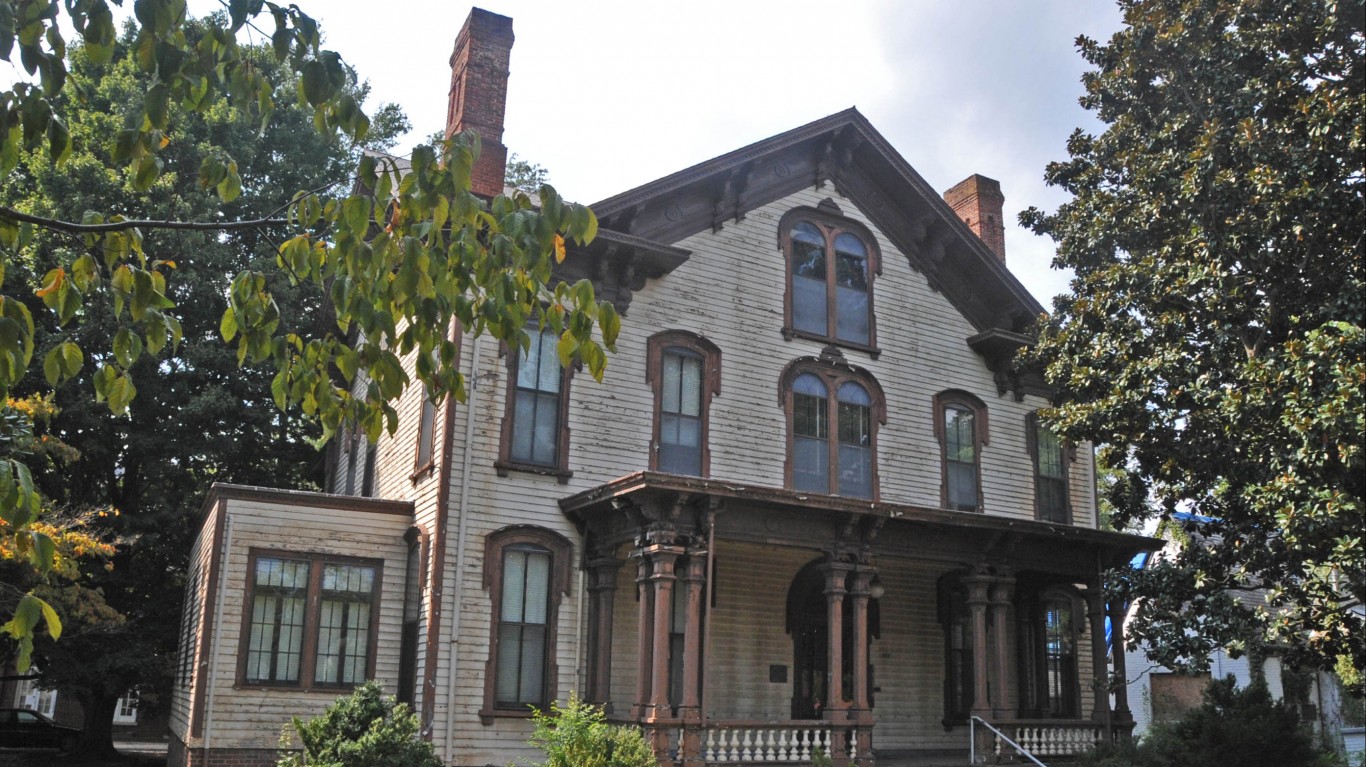
33. North Carolina: Wake County
> County median household income: $73,577
> State median household income: $50,320
> Poverty rate: 10.1%
> Oct. unemployment: 2.9%
> Major metro area: Raleigh, NC
Wake County occupies much of North Carolina’s Research Triangle, home to several scientific research universities and a concentration of jobs in research-intensive industries. The educational attainment rate in the county is very high. More than half, 51%, of adults have at least a bachelor’s degree, exceeding the college attainment rate for the state by more than 20 percentage points.
A large share of workers in Wake County are employed in the typically high-paying scientific, professional, and managerial sector, which likely helps boost incomes. The area’s $73,577 median annual household income is more than $23,000 higher than the state’s median income.
See all stories featuring: North Carolina

34. North Dakota: Williams County
> County median household income: $89,874
> State median household income: $61,285
> Poverty rate: 9.0%
> Oct. unemployment: 1.7%
> Major metro area: N/A
North Dakota is the fastest growing state in the country, with the population increasing by 10.2% over the past five years — nearly triple the national growth rate. The state’s oil boom is the reason for the influx of residents, and it likely also explains why Williams County is the wealthiest county in the state.
Unemployment in Williams County stands at 1.7% — below both the 2.0% state and 3.8% national unemployment rates. The typical household in Williams County earns nearly $90,000 a year, well above the state’s $61,285 median annual household income.
See all stories featuring: North Dakota
[in-text-ad-2]

35. Ohio: Delaware County
> County median household income: $100,229
> State median household income: $52,407
> Poverty rate: 5.1%
> Oct. unemployment: 3.3%
> Major metro area: Columbus, OH
Delaware is the only one of Ohio’s 88 counties where over a half of all households earn at least $100,000 a year. The typical Ohio household earns roughly half that much a year. Delaware County is located just north of Columbus, providing area residents access to jobs in and around the state capital. Partially as a result, just 3.3% of workers in the county are unemployed, below the 3.8% national unemployment rate. Additionally, just 2.6% of county households live on less than $10,000 per year, roughly a third of the comparable across Ohio as a whole.
See all stories featuring: Ohio

36. Oklahoma: Canadian County
> County median household income: $69,220
> State median household income: $49,767
> Poverty rate: 7.9%
> Oct. unemployment: 2.5%
> Major metro area: Oklahoma City, OK
Canadian County, Oklahoma, lies just to the west of Oklahoma City. The close proximity to a major city provides residents with the opportunity to access a wide range of high-paying jobs, particularly in the energy sector. OGE Energy, Devon Energy, and Chesapeake Energy are all headquartered in Oklahoma City.
Just 2.5% of the county’s labor force is unemployed, well below the 3.0% state unemployment rate. The low unemployment rate likely helps drive down the poverty rate in the area. Just 7.9% of Canadian County residents live in poverty, less than half of the 16.2% statewide poverty rate.
See all stories featuring: Oklahoma
[in-text-ad]

37. Oregon: Washington County
> County median household income: $74,033
> State median household income: $56,119
> Poverty rate: 10.3%
> Oct. unemployment: 3.5%
> Major metro area: Portland-Vancouver-Hillsboro, OR-WA
Washington County spans the area directly west of Portland, Oregon’s largest city. Most households in the county earn more than $74,000 per year, though some earn much more than that. Some 7.8% of county households earn more than $200,000 in a year, one of the higher such concentrations in the country.
Wealthy counties often have well educated populations. In Washington County, 42.4% of adults have at least a bachelor’s degree, over 10 percentage points higher than the state’s 32.3% bachelor degree attainment rate.
See all stories featuring: Oregon

38. Pennsylvania: Chester County
> County median household income: $92,417
> State median household income: $56,951
> Poverty rate: 6.9%
> Oct. unemployment: 3.0%
> Major metro area: Philadelphia-Camden-Wilmington, PA-NJ-DE-MD
Counties with higher levels of education tend to also have higher median household incomes, and Chester County, Pennsylvania, is no exception. The county’s median household income of $92,417 a year is more than $35,000 higher than the state’s median. This may be due at least in part to the fact that 51% of adults finished college, compared to 30.1% of adults statewide.
Chester County sits just west of Philadelphia, providing its residents with access to the many jobs available in that city. This proximity to a major job center may be one of the reasons why the county’s unemployment rate is relatively low, at just 3.0%. The state’s 3.9% unemployment rate is nearly a full percentage point higher than the county’s.
See all stories featuring: Pennsylvania

39. Rhode Island: Washington County
> County median household income: $77,862
> State median household income: $61,043
> Poverty rate: 9.6%
> Oct. unemployment: 2.5%
> Major metro area: Providence-Warwick, RI-MA
With a median household income of nearly $78,000 a year, Washington County is Rhode Island’s wealthiest county, beating out the four other counties in the state. As much of the county sits along the coast, many residents work in tourism and similar industries that come with oceanside living. Of county workers, 13.4% are employed in the art, entertainment, recreation, and accommodation sector, one of the higher concentrations among all U.S. counties.
Despite the relative economic prosperity, Washington County’s population actually shrunk slightly over the past five years. Though Rhode Island’s population grew slightly in the same time frame, the county’s population fell by about 0.4%.
See all stories featuring: Rhode Island
[in-text-ad-2]

40. South Carolina: Beaufort County
> County median household income: $60,603
> State median household income: $48,781
> Poverty rate: 11.9%
> Oct. unemployment: 3.1%
> Major metro area: Hilton Head Island-Bluffton-Beaufort, SC
South Carolina’s median household income of $48,781 a year is nearly $9,000 below the national median. Beaufort County stands out as the only county in the state with a median annual household income above $60,000.
Beaufort County is located near the southern tip of the state, running along the Atlantic Ocean, and it is largely made up of inlets and coastline. This oceanfront location likely helps drive up real estate prices in the area. The median home value in the county of $283,800 is the highest in the state. For comparison, the typical South Carolina home is worth $148,600.
See all stories featuring: South Carolina
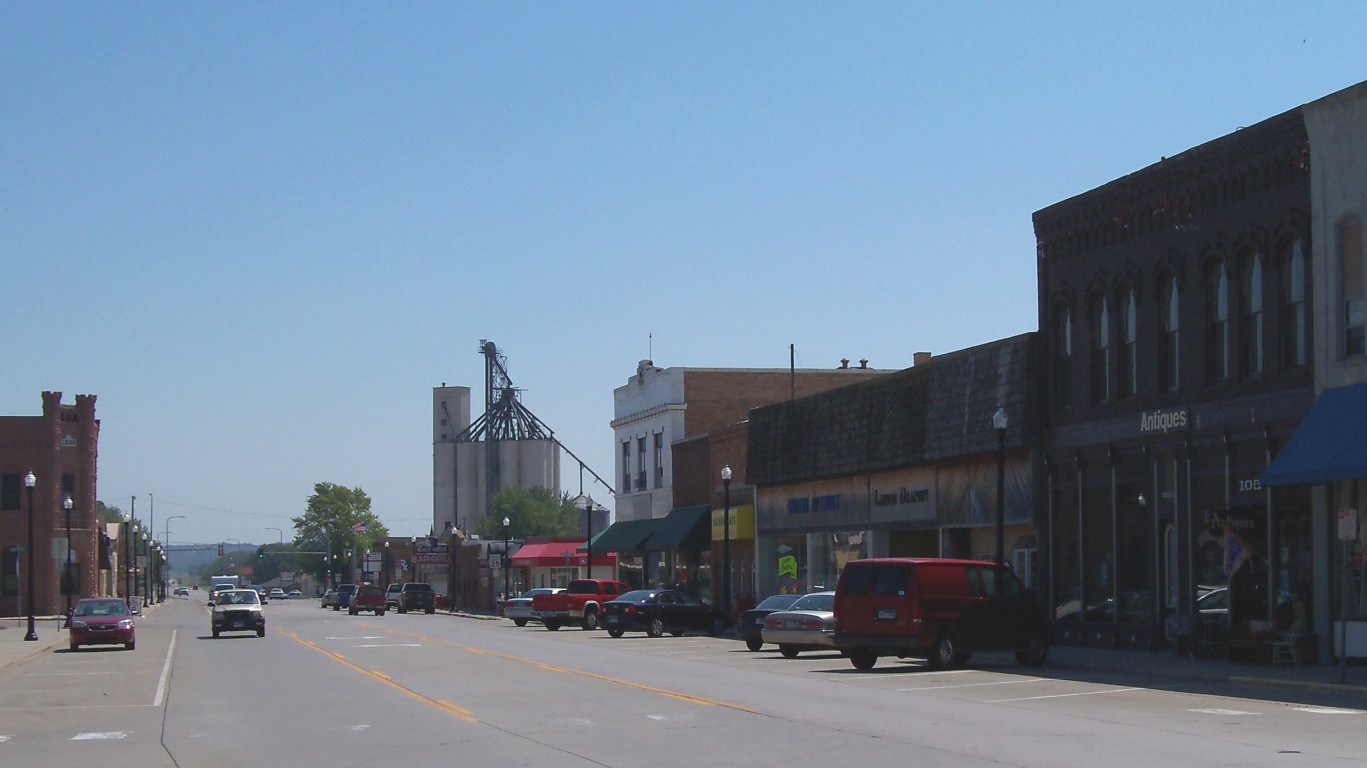
41. South Dakota: Lincoln County
> County median household income: $81,849
> State median household income: $54,126
> Poverty rate: 3.0%
> Oct. unemployment: 2.1%
> Major metro area: Sioux Falls, SD
The median annual household income in Lincoln County, South Dakota, is $81,849, more than 50% higher than the state’s median. The county’s high incomes are likely driven up by the many generally higher paying financial and health care positions available to those living in the area. Lincoln County sits just south of Sioux Falls, which is home to operations of a number of major corporations such as Citi, Wells Fargo, and Sanford Health.
The poverty rate in Lincoln County is just 3.0%, the fifth lowest of any county nationwide and a fraction of the 13.9% statewide poverty rate.
See all stories featuring: South Dakota
[in-text-ad]

42. Tennessee: Williamson County
> County median household income: $103,543
> State median household income: $48,708
> Poverty rate: 4.6%
> Oct. unemployment: 2.7%
> Major metro area: Nashville-Davidson–Murfreesboro–Franklin, TN
Williamson County, which sits just south of Nashville, is one of the wealthiest in the nation, with a median household income of $103,543 a year. It also has one of the best-educated populations in the country, with a 58.1% bachelor’s degree attainment rate among adults.
Like many high-income counties that boast a strong job market and that are located within close proximity to a major city, Williamson County is growing fast. The county’s population has grown by 15.2% over the past five years, nearly four times the comparable 3.8% state population growth rate.
See all stories featuring: Tennessee

43. Texas: Fort Bend County
> County median household income: $93,645
> State median household income: $57,051
> Poverty rate: 8.1%
> Oct. unemployment: 3.6%
> Major metro area: Houston-The Woodlands-Sugar Land, TX
Fort Bend County, Texas, is one of the fastest growing areas of the country. In the past five years, the county’s population increased by more than 123,000 people, a 21.1% growth rate. That is more than five times the U.S. population’s growth rate. This area sits southwest of Houston and boasts the highest median annual household income in Texas, at $93,645.
More than 15% of households in the county earn over $200,000 annually. Like many other wealthy areas, Fort Bend County has a well educated population. The area’s bachelor’s degree attainment rate of 45.7% far surpasses the state bachelor’s degree attainment rate of 28.7%.
See all stories featuring: Texas

44. Utah: Summit County
> County median household income: $94,952
> State median household income: $65,325
> Poverty rate: 7.5%
> Oct. unemployment: 3.3%
> Major metro area: N/A
Situated just east of Salt Lake City, Summit County extends into the Uinta-Wasatch-Cache National Forest and is home to Park City, an upscale resort community. As in other counties on this list, Summit’s population is well educated. Over half of all adults in Summit County have a bachelor’s degree or higher, the largest share in Utah, and the typical household earns about $95,000 year, also the highest of any county in the state.
See all stories featuring: Utah
[in-text-ad-2]

45. Vermont: Chittenden County
> County median household income: $66,906
> State median household income: $57,808
> Poverty rate: 11.3%
> Oct. unemployment: 1.6%
> Major metro area: Burlington-South Burlington, VT
Chittenden County, Vermont’s 1.6% lowest unemployment rate is tied as the lowest in the state. As almost all county residents who seek employment are able to find it, the median household income is relatively high. The county’s median household income of nearly $67,000 a year is more than $9,000 higher than the median household income in Vermont.
It is likely not a coincidence that, as the wealthiest county in Vermont, Chittenden’s population is also the best educated. Nearly half of all adults in the county, 49.6%, have at least a bachelor’s degree. This far surpasses Vermont’s state bachelor’s degree attainment rate of 36.8%.
See all stories featuring: Vermont

46. Virginia: Loudoun County
> County median household income: $129,588
> State median household income: $68,766
> Poverty rate: 3.7%
> Oct. unemployment: 2.3%
> Major metro area: Washington-Arlington-Alexandria, DC-VA-MD-WV
Loudoun County, Virginia is within commuting distance of Washington D.C. Proximity to the countless jobs in and around the nation’s capital partially explains the area’s 2.3% unemployment rate, one of the lowest of any county and well below the 3.8% national rate.
Many of the area jobs are high skilled and high paying. About 60% of county adults have a bachelor’s degree or higher — roughly double the 30.9% national percentage — and the typical area household earns about $130,000 a year, the highest income of any county by more than $12,000.
See all stories featuring: Virginia
[in-text-ad]

47. Washington: King County
> County median household income: $83,571
> State median household income: $66,174
> Poverty rate: 10.2%
> Oct. unemployment: 3.2%
> Major metro area: Seattle-Tacoma-Bellevue, WA
King County, Washington, includes Seattle, which is home to several major companies’ headquarters, including Starbucks, Amazon, and Microsoft. The companies employ many in the area in high-paying corporate jobs. About 18.9% of county workers are employed in the professional, scientific, and management sector, one of the highest concentrations of any U.S. county.
Most households in King County earn more than $83,500 a year, and a high percentage earn much more. Some 13.4% of area households earn at least $200,000 per year, more than double the national share and one of the highest shares nationwide. The area’s high incomes have likely made real estate in the county much more expensive. The median home in the area is worth $446,600, more than double the typical American home value.
See all stories featuring: Washington

48. West Virginia: Jefferson County
> County median household income: $72,526
> State median household income: $44,061
> Poverty rate: 9.9%
> Oct. unemployment: 3.1%
> Major metro area: Washington-Arlington-Alexandria, DC-VA-MD-WV
Jefferson County, West Virginia, borders both Maryland and Virginia and is by far the wealthiest county in the state. The median household income of $72,526 a year is more than $13,000 higher than any other West Virginia county. As part of the Washington, D.C. metro area, residents have access to high paying jobs in and around the nation’s capital. High incomes in Jefferson County are bolstered by a strong job market. Statewide, the unemployment rate is 4.6%. In Jefferson County, it is just 3.1%.
Home values in an area typically mirror incomes. West Virginia has nearly the lowest median home value of any state at $111,600. In Jefferson County, the typical home is worth $227,300.
See all stories featuring: West Virginia

49. Wisconsin: Waukesha County
> County median household income: $81,140
> State median household income: $56,759
> Poverty rate: 5.0%
> Oct. unemployment: 2.5%
> Major metro area: Milwaukee-Waukesha-West Allis, WI
Waukesha County’s median annual household income is more than $24,000 higher than Wisconsin’s median. The county is due west of Milwaukee, allowing residents access to jobs in the city. The county has one of the lowest poverty rates in the nation, at just 5.0%, less than half of Wisconsin’s poverty rate.
Waukesha County’s economy is largely dependent on manufacturing. Of the county’s labor force, 18.3% are employed in the manufacturing sector, a rate 8.0 percentage points higher than the U.S. labor force.
See all stories featuring: Wisconsin
[in-text-ad-2]

50. Wyoming: Campbell County
> County median household income: $80,178
> State median household income: $60,938
> Poverty rate: 9.4%
> Oct. unemployment: 3.7%
> Major metro area: N/A
The median household income in Campbell County is more than $80,000 a year, nearly $20,000 higher than the median household income across Wyoming. Campbell County owes much of its prosperity to the oil and natural gas industry. More people in Campbell County work in extraction than any other industry.
Like many oil-rich counties, Campbell County bucks the trend that the wealthier counties tend to have better-educated populations. Oil and natural gas production provides high-paying jobs with relatively low educational attainment requirements. Statewide, 26.7% of Wyoming adults have a bachelor’s degree. In Campbell County, that rate is just 18.5%.
See all stories featuring: Wyoming
Travel Cards Are Getting Too Good To Ignore (sponsored)
Credit card companies are pulling out all the stops, with the issuers are offering insane travel rewards and perks.
We’re talking huge sign-up bonuses, points on every purchase, and benefits like lounge access, travel credits, and free hotel nights. For travelers, these rewards can add up to thousands of dollars in flights, upgrades, and luxury experiences every year.
It’s like getting paid to travel — and it’s available to qualified borrowers who know where to look.
We’ve rounded up some of the best travel credit cards on the market. Click here to see the list. Don’t miss these offers — they won’t be this good forever.
Thank you for reading! Have some feedback for us?
Contact the 24/7 Wall St. editorial team.
 24/7 Wall St.
24/7 Wall St. 24/7 Wall St.
24/7 Wall St.


